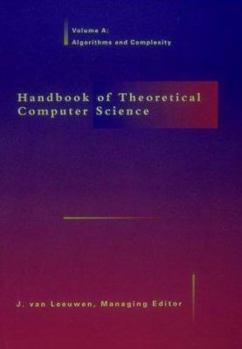Handbook of Theoretical Computer Science - 2 Vol Set
The Handbook of Theoretical Computer Science provides professionals and students with a comprehensive overview of the main results and developments in this rapidly evolving field. Volume A covers models of computation, complexity theory, data structures, and efficient computation in many recognized subdisciplines of theoretical computer science. Volume B takes up the theory of automata and rewriting systems, the foundations of modern programming languages, and logics for program specification and verification, and presents several studies on the theoretic modeling of advanced information processing. The two volumes contain thirty-seven chapters, with extensive chapter references and individual tables of contents for each chapter. There are 5,387 entry subject indexes that include notational symbols, and a list of contributors and affiliations in each volume.
Format:Paperback
Language:English
ISBN:0262720205
ISBN13:9780262720205
Release Date:January 1994
Publisher:MIT Press (MA)
Length:2 Pages
Weight:3.90 lbs.
Dimensions:4.0" x 7.1" x 10.0"
Customer Reviews
1 rating
Massive collection on computer science
Published by Thriftbooks.com User , 24 years ago
This collection of articles on the foundations of computer science is a nice addition addition to the literature and guides the reader to further reading on the subject. I did not read all of the chapters so I will concentrate my remarks on the ones that I did: Chapter 4 on Kolmogorov complexity puts emphasis on the applications and the authors endeavor to bring the reader quickly to the level of understanding needed for applications. The ones discussed are primarily in the area of parallel computation and branching programs. The chapter on algorithms for finding patterns in strings is nicely written and the authors do a good job of summarizing the main results. Computational biologists dealing with string matching algorithms may find the presentation very helpful. The author uses pseudocode to illustrate the main algorithms, such as Knuth-Morriss-Platt, Boyer-Moore, Aho-Corasick, and Commentx-Walter. Concrete examples are given for each of these algorithms. The chapter on computational geometry discusses the main algorithms for finding convex hulls and Voronoi diagrams are discussed in fairly good detail. Linear programming, triangulation, and point locating are given a fast treatment. The author does make use of pictures to illustrate the the algorithms. The only disappointment was that combinatorial geometry was given only a very cursory treatment. Of particular importance to me was the chapter on algorithms in number theory. Interestingly, the authors jump right into a discussion of elliptic curves and actually do a fairly good job (within 4 pages) of summarizing this massive area of mathematics. The authors return to elliptic curves in a later section on factoring integers, after discussing algorithms for finite abelian groups. The Shanks baby-step-giant-step, Pollard's rho method, the Chinese Remainder theorem, and the index calculus algorithm are discussed concisely. Elliptic curves are again used in the section on primality testing. There is a good summary of cryptography in Chapter 13, with the most interesting discussions on probabilistic encryption, "over-the-phone" poker, and zero-knowledge interactive proofs. In Volume B, those interested in the foundations of logic and functional programming, Chapter 6 on rewrite systems covers the main points. The chapter is fairly long an detailed. Functional programming and lambda calculus are contained in the next chapter with proofs given of the main results. The most interesting section is on denotational semantics. LISP is discussed a little at the end of the chapter. Chapter 10 also discusses logic programming in a fairly detailed manner. The most interesting sections are the ones on the completion of programs and deductive databases. The author ends the chapter with a brief history of logic programming. In reading this I found out that there has been work done on developing a theory of logic programming based on 3-valued logic and useful references were given. The theory of relational data





